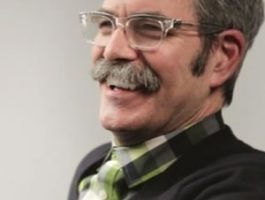
Great, Unrealistic Expectations
Think back to when you first got married. What were your expectations? Popular speaker and author Paul David Tripp talks about the reality of marriage and reminds couples that marriage is a union between two flawed people in a fallen world.
Show Notes
About the Host
About the Guest
-
Think back to when you first got married. What were your expectations? Popular speaker and author Paul David Tripp talks about the reality of marriage and reminds couples that marriage is a union between two flawed people in a fallen world.
-
Dave and Ann Wilson
Dave and Ann Wilson are hosts of FamilyLife Today®, FamilyLife’s nationally-syndicated radio program. Dave and Ann have been married for more than 38 years and have spent the last 33 teaching and mentoring couples and parents across the country. They have been featured speakers at FamilyLife’s Weekend to Remember® marriage getaway since 1993 and have also hosted their own marriage conferences across the country. Cofounders of Kensington Church—a national, multicampus church that hosts more than 14,000 visitors every weekend—the Wilsons are the creative force behind DVD teaching series Rock Your Marriage and The Survival Guide To Parenting, as well as authors of the recently released book Vertical Marriage (Zondervan, 2019). Dave is a graduate of the International School of Theology, where he received a Master of Divinity degree. A Ball State University Hall of Fame quarterback, Dave served the Detroit Lions as chaplain for 33 years. Ann attended the University of Kentucky. She has been active alongside Dave in ministry as a speaker, writer, small-group leader, and mentor to countless wives of professional athletes. The Wilsons live in the Detroit area. They have three grown sons, CJ, Austin, and Cody, three daughters-in-law, and a growing number of grandchildren.
-

Paul David Tripp
Paul David Tripp is a pastor, author and conference speaker. He is the president of Paul Tripp Ministries and works to connect the transforming power of Jesus Christ to everyday life. This vision has led Paul to write 17 books on Christian living, produce 14 teaching series and travel aroun...more
Author Paul David Tripp talks about the reality of marriage.
Bob: —“Can you remember what was the expectation you had of marriage—that it didn’t take long, after you were married, to realize, ‘I wasn’t thinking straight.’?” Do you remember anything that—
Dennis: Well, I remember that part of the process that we went through, as a couple, in really solidifying our engagement was we wrote down all of our fears. I had four pages of fears—single-spaced! [Laughter]
Bob: Wow!
Dennis: I mean—all kinds of things! They were tied to expectations—wanting to be a great husband and being afraid I wouldn’t be able to execute that—wanting to be a lover of my wife’s soul and not being certain how [I] could do that.
Bob: You see, you were just over-thinking the whole deal because I just thought marriage was like dating forever—but you get to have sex—that’s I was thinking! [Laughter] You know, it kind of worked out okay for me except there was some reality that got thrown into it—the mix.
5:00
Dennis: Yes; and we’ve got a guest with us in the studio, Bob. It’s not often that we can genuinely label one of our guests as a trouble-maker, but Paul David Tripp is a trouble-maker. The reason he’s a trouble-maker is he is unwilling to allow people to settle for mediocrity. So, he’s going to stir the pot. He’s been on FamilyLife Today before, and I’d just like to welcome him back.
Paul, it’s great to have you back on the broadcast.
Paul: It is great to be here.
Dennis: He’s written a book called What Did You Expect? He and his wife Luella have four adult children. Paul is the President of Paul Tripp Ministries. He’s a counselor and author. How many books have you written now, Paul?
Paul: Eleven.
Dennis: Eleven? This one—What Did You Expect?—talks about what Bob was discussing here—our expectations about marriage. When people get married today, they really do have high expectations; don’t they?
6:00
Paul: Well, my experience, as a premarital counselor, is that, again and again, I’d be sitting with a couple, trying to get them to think about marriage in a realistic way. A potential wife is looking at a potential husband with what I call “goo-goo eyes”. I can barely get their attention. She’ll say something along these lines: “I don’t think I could ever get angry at him.” [Laughter]
I’m angry just to hear it! I’m thinking, “Now, what’s a more biblical way of thinking about marriage?” Here it is: “What is marriage? It’s a flawed person married to a flawed person in a fallen world”—are you encouraged yet? [Laughter]—but with a faithful God.” I think there are thousands of couples that get married with unrealistic expectations.
Bob: And they’re thinking kind of like I was thinking—that: “This is just dating, but you get to mix in sex; and it’s going to be happy ever after.”
7:00
Paul: Well, part of the problem is the weirdness of Western culture dating. That’s the difficulty.
Dennis: Yes, the whole dating system is set up to—I don’t want to say to deceive the other person because it’s not really intentional deceit.
Paul: It’s not self-conscious.
Dennis: It’s just two people who are trying to impress one another. Help us understand how it is—in Western culture—we enter into this most intimate of all relationships with so many unrealistic expectations.
Paul: I think that we think that strength of affection—strength of romance—is a sturdy enough foundation to protect us from the kinds of things that other people are dealing with.
Dennis: We think it’s going to carry the day.
Paul: Yes. The fact of the matter is that what really creates the difficulty that we have in living in relationship with one another lives at a profoundly deeper level than romance.
8:00
Romance is just not enough of a foundation to make a long-term, perseverant, healthy relationship work.
Bob: When I was growing up, I heard on the radio: Love Will Keep Us Together and All You Need Is Love. I remember people getting married with no job and no money. They would say, “We don’t need those things because our love will sustain us,” only to find out that you do need some of those things to sustain life beyond a couple of weeks; right?
Paul: Yes, I think that what you’ve talked about is sort of deep in the sort of functional philosophy of Western culture: “Love will do it.”
Bob: Yes. You watch the romance movies, and they reinforce that. The love songs reinforce that. It’s not until we’re trying to do real marriage that we get the wake-up call. What happens to a couple when they get that wake-up call?
Paul: Well, panic. Often, the panic then leads to all kinds of dysfunctional ways of responding to one another.
9:00
The call that I got, closest to the marriage ceremony, was six-thirty the next morning. The wife calls me; and she says, “It’s over!” My response to her—she didn’t understand at first—I said, “Praise the Lord!” because I think, at that point, they really face the reality: “We are two people in desperate need of help.” They were ready, at that point, to make a marriage.
Bob: What had happened between the wedding and six-thirty the next morning? Do you know?
Paul: Reality—just that low-level self-centeredness, impatience, easy irritation—all those kinds of things that are really where marriages go wrong. Think about this: “We don’t live in big moments. You only make three or four big decisions in your entire life.” We live in those little mundane moments. It’s in those moments that a marriage disintegrates. Now, fortunately, they did the right thing. She got on the phone and said: “This already has not been what we were expecting. We need help.”
10:00
That was the beginning of real good things for them.
Dennis: We start the Weekend to Remember® marriage getaway, Paul, with a message called “Five Reasons Why Marriages Fail”. One of those reasons is that reality begins to edit the illusion. That’s what you’re talking about.
Paul: Absolutely.
Dennis: In the midst of everyday life—the mundane—reality begins to chip away at the feelings and the emotions—and reveals that it’s not only not a sturdy foundation—it is quicksand.
Paul: Right.
Dennis: The more you struggle with the emotions, the more you’re going to go under.
Bob: Okay, so if it’s not love that keeps you together, if it’s not that strong—
Dennis: Well now, we didn’t say that, though. We didn’t say that it wasn’t love that kept us together. We’re talking about a false kind of love, here, that equates love with feelings.
Bob: We’re talking about romance and passion. If that’s not the foundation; what is?
11:00
Paul: Well, sort of the theme phrase of the book is: “A marriage of unity, and love, and understanding is not rooted in romance; it’s rooted in worship.” Now, that’s one of those sentences where you can understand all of the words and not know what it means—
Bob: Right.
Paul: —because, when people hear the word, “worship”, they think Sunday morning—singing, preaching, hymns. They don’t realize that worship is, first, my identity before it’s ever an activity. Marriage has to get at what really rules my heart—and what’s really controlling me—because I drag that into this relationship. I never leave my heart at the door.
There’s a passage in Second Corinthians 5:15 I think is tremendously helpful. It says, “Jesus came”—this is the purpose statement for the cross—“so that those who live would no longer live for themselves, but for Him who loved them and gave Himself for them.”
12:00
Paul is arguing that the DNA of sin is selfishness. Rather than living for something bigger than myself—two great commands—for God with respect to other people—I shrink the world down to the small confines of my wants, my needs, my feelings. If the DNA of sin is selfishness, then sin, in its fundamental form, is antisocial because: “I really don’t want to love you. I want you to love me as much as I do.”
Bob: Yes.
Paul: I’m shopping for somebody who will deliver, to me, the things that I want. So, if the DNA of sin is selfishness, then sin, in its fundamental form, is antisocial.
Here’s the third thing: It will cause me to dehumanize that person in my life. I quit looking at them as an object of affection. They become a vehicle or an obstacle: “If you help me get what I want, I love you. I thank God that you’re in my life,”—cards and flowers. “If you stand in the way of what I want, I’m spontaneously impatient and angry because you’re an obstacle.”
13:00
Now, who talks about this stuff? What marriage book talks about this stuff? It’s a scandal because this is the seedbed of all that low-level nastiness. We fight about things that don’t make any difference because we’re so self-oriented. We make big issues out of little things. If you’re fighting about all those little things, you never get to the big, important things in your marriage because you’re expending so much effort just being able to cope with one another.
Dennis: When I think of the word, “worship”, I think of affection: “What’s important to me? What am I fond of? What gets my attention? What demands my allegiance?” What I hear you saying is that: “If we make Jesus Christ, the Scriptures, and God the centerpiece of our existence—our identity—then, there’s hope for two imperfect people, in a fallen world, to make a real marriage work.”
14:00
Paul: Absolutely. I like what you said there. I tend to say it this way—that: “This side of eternity, it’s very hard for me to keep—what is truly important—important in my life. I allow things that are not important to rise to levels of importance, and they begin to set the agenda. Although I haven’t forsaken Jesus, there’s now something in my life that’s in the place of Jesus in my life.”
Now, here’s what this means. I think this is really radical. That means that you don’t first fix marriages, horizontally. You first fix them, vertically. You have to deal with that heart issue: “What has your affection? What are the treasures/pleasures that you’re actually living for?”
Dennis: Paul, you used an illustration of a woman who turned her home into a design museum.
15:00
That really is describing Jeanie and her husband Tony, but Tony had another thing that he worshipped. It was his career. Can you kind of unpack how—these two, who were married together—how he’s worshipping his career / she’s worshipping her home—how it was nearly their undoing?
Paul: Well, think about guys like Tony. If I’m worshipping my career, and it’s the end of my day, I am actually driving away from the domain that gives me value—that gives me identity, that gives me meaning and purpose. What—if I’m honest with myself—what I actually want is to be left alone, when I get home, because that domain is not valuable to me. I can feel myself getting a bit uptight as I’m getting nearer my house because I know there’s going to be expectations for me—that are not exciting, and engaging, and meaningful to me—because my identity is back there.
16:00
Bob: So, a guy will stay at the office longer—as long as he can—and only go home just to do the bare minimum, if he’s wired that way.
Paul: And he sort of sighs his way through the dinner meal—you know, [sighs] —and then he goes off to his cave. Meanwhile, she’s built this physical environment that is her identity. She wants him to participate in the affirmation of that and the participation of keeping this environment that way. I mean, this will never work because what engages her is not of interest to him, at all; and what engages him is not of interest to her, at all.
Dennis: They have two different worlds.
Paul: Absolutely.
Dennis: And what you’re saying is: “You can’t begin to make the marriage the new world that they both focus on.” It’s not found on the horizontal.
17:00
It really is found in the vertical—of people turning their hearts toward an affection toward Jesus Christ, and a surrender to Him to do His will, and live life, wisely, according to the Scriptures; right?
Paul: Yes, the way that I would say that is: “You recognize that war—that’s fought in all situations and locations of everyday life—between the kingdom of God and the kingdom of self. When you have two people—who exit their little claustrophobic kingdoms and begin to get engaged and excited about the kingdom of God—now, they’re serving the same kingdom. They’re serving the same King. They have the same set of values. What’s meaningful and purposeful in life—they share. Now, they’ve got a basis for unity, understanding, and love.
Dennis: And they understand what real love is.
Paul: Yes.
Bob: So—a couple who looks at the experience of life, and they go: “Yes, I’d rather be at work,” or, “I’d rather be playing golf on Saturday morning,” and, “We’d like it to be better than it is.” How do they move from where they are to where they need to be?
18:00
Paul: Here’s the first thing—I think this is very difficult but is liberating—I look in the mirror; and I say: “I am my greatest marriage problem—not my circumstances, not my children, not my wife. My biggest marriage difficulty exists inside of me, not outside of me.” What Paul says is tremendously humbling—in Second Corinthians—and tremendously liberating—is: “Jesus Christ came to rescue me from me because I’m my biggest danger to me. I do this to me.”
If you get two people who get that! I mean—think about this——average marriage counseling—you ask the wife, ‘What’s wrong with your marriage?’ who’s she going to talk about?”
Bob: Her husband; right.
Dennis: Her husband.
Paul: And Paul says: “Don’t you get it? This thing is inside of you.” Now, the encouraging thing is this is exactly what Jesus came for—
19:00
to liberate you from you so that you can know the thing that you were made for—a life of loving, worship, and service of God, and a life of love for the people God has placed in your life. There is true contentment—true joy—but you need to be free from you, and only the grace of the Lord Jesus Christ has the power to do that.
Dennis: Yes, and it is Christ’s words that lift us from living life on the horizontal and thinking it’s found there. I’m just reflecting back on what He said in John 15:12-13. Jesus said to the disciples—He said: “This is my commandment, that you love one another, just as I have loved you. Greater love has no one than this,” Now, this is a key statement.
If the King of the universe is making a statement to say, “I’m about to give you a picture that is the greatest picture of love that any person can possess,” wouldn’t you move to the edge of your seat to hear what the Savior said?
20:00
Well here’s what He said: “Greater love has no one than this, that one lay down his life for his friends.” And who’s your friend? Well, I think your spouse is. I think that’s where you start.
I think what you’re calling people to do, Paul, in your book, is really taking them back to the Bible—and the words of Christ—and calling them back to the cross of Christ, which demands our submission to Him. It demands our affection because that’s where the love of God was poured out on our behalf. Christ is alive from the dead, and He’s not a dead God. He is worthy of our worship.
If we worship Him, He will give us the ability to love. We won’t do it perfectly—we’re still going to have those mundane moments. We’re still going to live in them, but you know what? Your lives—your marriage, your family, and your legacy—are going to be lifted to a whole new level.
21:00
Bob: I love the way you talked about this in The Art of Marriage video series—when you said, “What the cross promises a marriage is fresh starts and new beginnings.” That is a whole new level of marriage. That’s really what we’re trying to communicate in The Art of Marriage video series. We got guys like Paul David Tripp together with Crawford Lorritts, and Voddie Baucham, and Al Mohler, and Russell Moore, and Dennis Rainey, and Michael Easley. We got all these guys and had them talk about what marriage is supposed to look like, from a biblical perspective.
So far, we’ve had more than 350,000 who have been to an Art of Marriage event. We have had several thousand couples who have stepped forward to say, “We would be willing to host one of these events in our local church.” That is what has caused The Art of Marriage to be received as widely as it has been.
22:00
Our team noticed that—next year, February of 2014—Valentine’s Day is on a Friday night. We thought: “Why don’t we see if we can’t encourage FamilyLife Today listeners, and others, to host an Art of Marriage event on Valentine’s weekend in their local church? What if we could get 2,014 churches doing this on 2-14 in 2014?”
You know, if you want to do something other than The Art of Marriage that weekend, there are other great video resources that you can use; or your church could put on its own event of some kind; but wouldn’t it be cool if there were thousands of churches—all doing something—to promote a biblical understanding of marriage on Valentine’s weekend? That’s what our goal is for 2014.
To add a little incentive to the mix here, if you’re willing to host one of these events, we will partner with you. We’ll send you the event kit for free. Here’s how that works: You go to FamilyLifeToday.com. You click on the link for The Art of Marriage. We’ll get you a certificate that is good for a free event kit.
23:00
Then, all you have to do is get at least five couples signed up to be part of your Art of Marriage event, whether you’re having it Valentine’s weekend or some other time this spring. You get, at least, five other couples; and you place your order for the manuals for those couples. If you’re ordering, at least, five couples’ sets of manuals, we’ll send you the event kit free with your certificate.
So, today, go to FamilyLifeToday.com. Click on the link for The Art of Marriage. Get your certificate and have that ready. Then, as you start to plan the event——when you’re ready to order your workbooks—just include the certificate when you place your order for the manuals; alright?
By the way, while you’re on our website, check out the information about Paul David Tripp’s book on marriage. It’s called What Did You Expect? Paul says, in the book: “Since we’re always sinners married to sinners, being reconciled to one another isn’t just the right response in moments of failure. We have to live a lifestyle of reconciliation to have a healthy marriage.”
24:00
He talks about that in the book, What Did You Expect? You can order it from us, online, at FamilyLifeToday.com; or you can call 1-800-“F” as in family, “L” as in life, and then, the word, “TODAY”.
Be sure to join us back again tomorrow when we’re going to talk about what happens in a marriage when we start to make mountains out of molehills. Come on—let’s be honest. We’ve all done it; right? We’ll talk about it tomorrow with Paul David Tripp. I hope you can be here for that.
I want to thank our engineer today, Keith Lynch, and our entire broadcast production team. On behalf of our host, Dennis Rainey, I'm Bob Lepine. We will see you back next time for another edition of FamilyLife Today.
FamilyLife Today is a production of FamilyLife of Little Rock, Arkansas.
Help for today. Hope for tomorrow.
We are so happy to provide these transcripts to you. However, there is a cost to produce them for our website. If you’ve benefited from the broadcast transcripts, would you consider donating today to help defray the costs?
Copyright © 2013 FamilyLife. All rights reserved.
1




